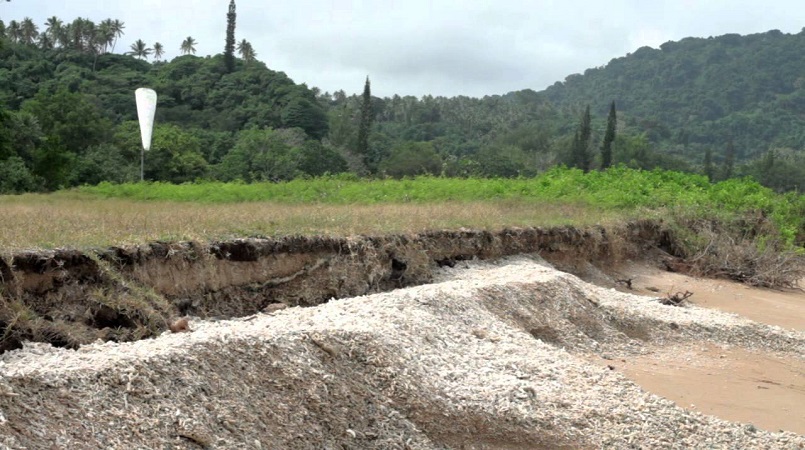
Vanuatu’s Leader of Opposition, Ralph Regenvanu is one of 14 Pacific leaders to condemn Australia’s Paris climate target as “one of the weakest”.
The leaders including former presidents and prime ministers, foreign ministers, archbishops and other church leaders, have written an open leader to the prime minister, Scott Morrison, “as Pacific Islander leaders whose homelands and cultures face certain devastation from climate change”.
“Pacific island nations have long been leaders in driving global progress to combat climate change,” the letter says. “However, Australia’s current Paris Agreement emission reduction target remains one of the weakest among wealthy nations.”
The Guardian reports the signatories included the former Kiribati president Anote Tong, the former Tuvalu prime minister Enele Sopoaga, the former Marshall Islands Hilda Heine, Regenvanu, and Cardinal Sir John Ribat, the Catholic Archbishop of Port Moresby.
The letter urges Australia to commit to net-zero emissions by 2050 and to develop a long-term low greenhouse gas emissions strategy by 2021. And it condemns Australia’s use of Kyoto protocol carryover credits, “which legally cannot, and morally should not, be used to meet Australia’s 2030 Paris Agreement target”.
“Australia needs the Pacific as much as the Pacific needs Australia,” it says. “As our children and grandchildren face unprecedented risks due to climate change, now is the time to stand together and work together to secure their future safety and prosperity.”
Australia was a signatory to the Pacific Islands Forum Boe declaration in 2018, which said climate change was the single greatest security threat to the Pacific.
But its climate position has consistently put it at odds with low-lying Pacific countries vulnerable to natural disasters, who have asked the Pacific grouping’s largest and most influential nation to do more.
Delayed by Covid-19, it is uncertain whether the Pacific Islands Forum leaders’ meeting will proceed this year, even virtually. These meetings have exposed the faultline between Australia and its Pacific neighbours over climate.
At last year’s forum, after a heated and protracted leaders’ meeting, Fiji’s prime minister, Frank Bainimarama, described Australia as “very insulting and condescending” in climate talks.
Australia has maintained the Pacific is “vuvale” – Fijian for family – and its “Pacific Step-Up” is assisting island nations in mitigation and adaptation, while working to cut emissions.
“Australia is successfully meeting our commitments and our targets and in fact we are exceeding them,” Morrison said this month. “But on top of that, dealing with climate change is also about building climate resilience for locked-in impacts … not just here in Australia, but in Pacific countries and that is where a big part of our support effort, some half a billion dollars, goes.”
Australia has established a $300m (US$200 million) Covid-19 response package to assist with economic and social recovery in the Pacific region, and has also committed $80m(US$58 million) to the Covax global alliance for vaccines to help south-east Asian and Pacific countries access a vaccine when one becomes available.
But in a submission to the government’s consultation on the Pacific Islands Forum 2050 strategy, the Australia Institute argues Australia “lacks ambition” in the Pacific, and is generally “reactive to changes in political balance and ... consistently parsimonious in extending development assistance”.
“Australia blows hot and cold and it is disappointing that domestic political fashion exerts more influence on South Pacific policy than do strategic considerations,” said Allan Behm, the director of the institute’s international and security affairs programme.
“Complex challenges facing the South Pacific, including climate change, human security challenges of health and food security, population growth and economic opportunity, require more targeted engagement, assistance and leadership from Australia.”
The submission argues that climate change is the most critical challenge facing the Pacific region and will exacerbate other existing fragilities and stressors surrounding food security, political instability and governance challenges.
“Australia and New Zealand must go beyond adaptation and remediation by increasing the ambition of greenhouse gas emissions reduction efforts and to begin managed immigration of peoples in the most vulnerable Pacific states.”....
Photo COP23 Caption: Soil erosion in Vanuatu
